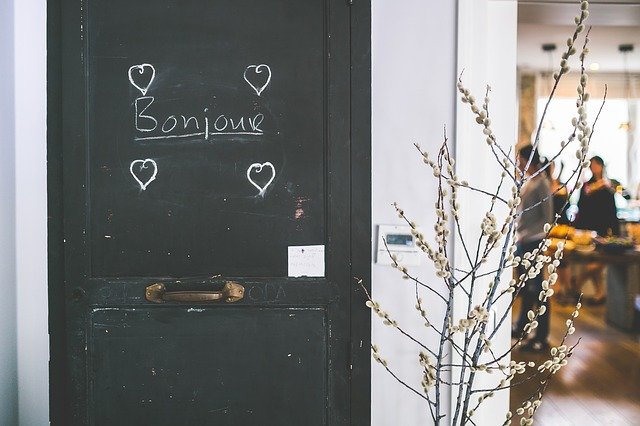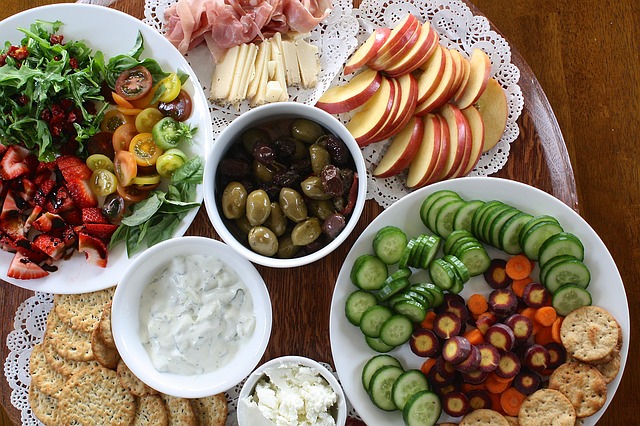Each country has its own set of habits and traditions that are passed down from generation to generation. They may be normal in one culture but not so in others. France is no exception. That’s why today we will talk about some French habits and traditions that might seem strange to foreigners.
Not too long ago, we talked about stereotypes, but this post will be a little different. This time it has to do with things that are generally accepted by the French. There are exceptions, of course, but these points we will discuss are true for the most part. Are you ready? C’est parti!
Saying Bonjour a Lot

In France, it’s very common to say bonjour (good morning, good day, or hello) or bonsoir (good evening) when talking to someone. It does not matter whether you are at school, work, the bank, a government office, the supermarket, a clothing store, a restaurant…you always say bonjour/bonsoir before anything else. You’re expected to greet everyone: your teacher, your boss, the server, a salesperson…everyone. Not doing so is considered impolite.
Addressing Strangers

The French are extremely formal people. When addressing a stranger, it’s expected to call them Monsieur (Mr.) or Madame (Mrs.). The word Mademoiselle (Miss) was used to address single ladies in the past but has fallen out of use since it is now considered sexist.
The same applies when addressing someone in authority like your teacher or boss. It’s impolite to call them by their first name unless they tell you to do otherwise.
Also, remember there are two words for “you” in French. We have the formal vous and the informal tu. If the person you have to talk to is not your friend, avoid using tu. Things are starting to change a little among the younger generations, but to stay on the safe side, use vous instead when addressing a stranger even if he/she looks young.
Kissing Others
Kissing someone on both cheeks is a very common form of greeting someone in informal settings. We call this practice faire la bise. Women kiss other women or men, while men only kiss women for the most part. Men may kiss other men but only those that are really close to them.
In some cultures, people only kiss one cheek, but in France, they kiss both. It may feel uncomfortable or strange for some at first, but you eventually get used to it.
Remember we only do this in informal settings. For instance, you don’t kiss your boss unless there is a close relationship between you two.
Food Portions Are Way Smaller

I remember one of my French teachers said he always felt flabbergasted when he went to American restaurants. He said food portions were enormous, even breakfast. He was not used to hearty breakfasts with pancakes, bacon, ham, sausage, and hashbrowns.
Not only breakfast, but the French also eat smaller portions whether it be lunch or dinner. Just so you have an idea, a study showed French portions were smaller than their American counterparts by an average of 25%! This may explain why France has such a low obesity rate.
Food is seen as something special, not just necessary. People like to take their time when eating. No rush here.
Eating Burgers…with Silverware
When a French friend of mine visited me for the first time, she was kind of shocked when she found out we eat burgers with our bare hands. How’s that possible?
I learned that the French use silverware to eat things like burgers and pizza. This is something you would never do in the U.S.
We see burgers as fast food or comfort food, in other words, something informal. Therefore, we don’t use silverware to eat them. But the French think differently. Unless it’s a fast food place, they eat their burgers with silverware.
The Apéro

The apéritif, simply known as l’apéro, is a sacred tradition in France. It’s normally served an hour before dinner between 6 p.m. and 9 p.m. It consists of light snacks and drinks. Think nuts, cheeses, dried fruit, olives, cured meats, pretzels, and the like. Drinks are usually port, vermouth, Pastis, or even beer. You can make it as simple or as sophisticated as you want.
This is not the time to stuff yourself, but rather to enjoy a few snacks in friends’ company. You can enjoy l’apéro at someone’s house or a restaurant.
Keeping It Down
The French tend to keep the volume down when conversing. They don’t like to draw attention to themselves but rather prefer to behave discreetly out in public. That means no loud talk or laughter. Do that and you will be frowned upon or even get angry stares.
Self-Service
Although bagging your groceries is gaining popularity in the U.S., it’s not the norm. However, in France, people always bag their own groceries. Don’t expect the cashier or someone else to do it for you.
No Tipping at Restaurants
Unlike the U.S., tipping is not common at French restaurants. In fact, the check already includes a 15% service charge, but you’re free to tip on top of that if you so desire.
No Dating

This is a very interesting point and something I would like to write about in detail in a later post. It turns out that French people don’t date or more precisely, their concept of dating is different from ours. It’s not that they don’t have any romantic relationships but rather, they’re implied. They don’t ask questions like, “What are we?” Instead, they assume exclusivity after spending a lot of time with someone or even after an innocent kiss. Of course, there are exceptions to the rule, but this is something you should always keep in mind. You don’t want to hurt somebody’s feelings, do you?
A French relationship is more about actions rather than words. In English, I love you can be said lightly, but in French, je t’aime is way stronger. It’s just not something you say to anybody.
Wrap-up
As you can see, there are many peculiar French habits and traditions. Some of them may be similar to your culture, but I’m sure at least one or two differ from it.
Remember, when learning a language, we also have to learn about the culture that’s behind it. Only so will your learning be complete.
What about you? Did you know about the points mentioned above? Let me know in the comments below. Au revoir, les amis!



This was very interesting. Although I am from Belgium (a neighbor to France) I can see some similarities. We also greet with two kisses, sometimes even three. The apéro is ppopular and I have always enjoyed it, I miss that sometimes, since I do not live in Belgium anymore.
I also spent a lot of time in France in my youth, so I can relate to everything you write about.
Your point about dating – or not dating – in France made me realize that this is perhaps the reason why I struggle here in North America with romance. I don’t understand why the question “what are we” needs to be asked. I don’t understand that dating someone doesn’t always imply romance, and I have been here many years … Your article made me realize that, so I thank you for the cultural explanation 🙂 Maybe it will help me with future dates 😉
Hi, Christine,
I can imagine the culture shock you’ve been through. It’s interesting to realize that even simple things might differ in two cultures.
I think the French way of dating is better lol, especially for those of us that are shy to ask.
Thanks for commenting.
Hello Enrique,
this is a very interesting and thought-provoking article. I can see many similarities in French habits with Spanish ones (kissing each other on cheeks, saying hello very often – “bon jour” in France / “hola” in Spain).
Some of the French habits are also similar to the habits in my country. We also don’t say “I love you” easily, I remember when I was younger it was even hard for me to say it to my boyfriend.
Also regarding portions, we also eat rather small portions, especially for breakfast (most people just eat one piece of bread or bread roll with something, I have a protein shake every morning), but also for lunch – usually a soup and then a small piece of meat with potatoes, rice, or dumplings.
I like reading about habits in other countries. It belongs to their history and sometimes you find their habits are better than yours 🙂
I’m looking forward to your next article.
Lenka
Hi, Lenka,
That’s really interesting. I’ve heard many countries in Europe share similarities like the ones you mentioned. Those things may not seem strange to you, but to people in the U.S. or Latin America, they are. I guess that happens because we’re heavily influenced by American culture on this side of the world.
Thanks for sharing your experience. 🙂